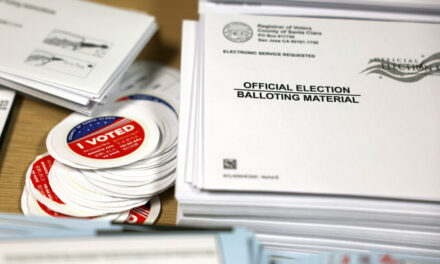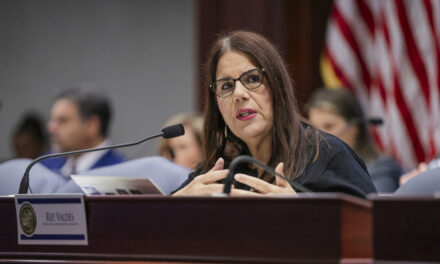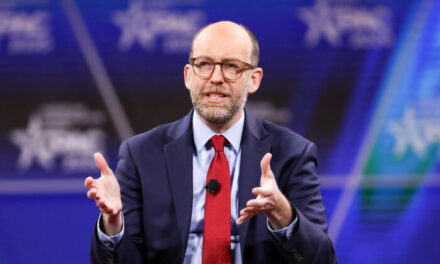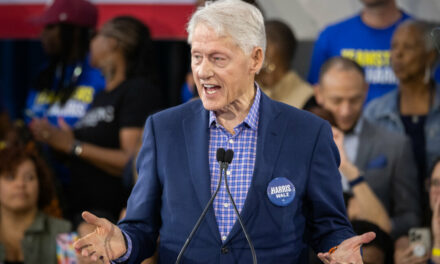We support our Publishers and Content Creators. You can view this story on their website by CLICKING HERE.
The Fed chair stressed the need for the Federal Reserve’s independence in a wide-ranging interview at the annual DealBook Summit.
Federal Reserve Chair Jerome Powell said on Dec. 4 that it is unlikely the U.S. central bank will lose its independence in the incoming Trump administration.
“I’m not concerned that there’s some risk that we would lose our statutory independence because I do think that those set of ideas are strongly believed by people,” Powell said at The New York Times’ DealBook Summit in a wide-ranging interview with host Andrew Ross Sorkin.
Powell stressed the importance of the U.S. central bank’s independence and why it is necessary for the broader economy, reiterating the significance of making monetary policy decisions that the administration or Congress cannot reverse.
“That gives us the ability to make these decisions for the benefit of all Americans at all times, not for any particular political party or political outcome,” the Fed chief said. “We’re supposed to achieve maximum employment and price stability for the benefit of all Americans and keep out of politics completely.”
Powell was nominated to helm the Federal Reserve in Trump’s first term. He was nominated to a second term by President Joe Biden.
Powell stated that another reason for the Fed’s independence is that it is self-funded. The central bank’s operations are funded mainly from the interest earned on its securities. After receiving funds to cover its expenses and transfers, the Fed transfers the net earnings to the Treasury.
In 2023, the Federal Reserve System registered a loss of more than $114 billion. After years of sending net earning remittances to the Treasury, it has been on a losing streak for more than two years.
“We’ve got strong legal independence, and we do try to run the Fed respectfully,” Powell said.
Incoming Treasury secretary nominee Scott Bessent proposed in October the idea of a shadow Fed chair. The president-elect would nominate and seek Senate confirmation of Powell’s successor as early as possible, long before Powell’s term ends in May 2026.
A shadow Fed chair could ensure that the financial markets become indifferent to what the incumbent says or enacts, Bessent said.
In recent months, Powell has dismissed the question of whether he would resign if Trump, after his inauguration in January, were to ask him to and the question of whether the president-elect could fire him.
Sorkin called the shadow Fed chair proposal an attempt to undermine Powell, who then told the CNBC personality, “I don’t think that’s on the table at all.”
“There’s got to be trust and mutual respect and acknowledgment of the different authorities and boundaries that we have,” he said. “But a very constructive relationship, because, you know, in times of crisis, we work much more together under the law.”
Powell said he’s confident that he will have “the same kind of relationship” with Bessent once he’s confirmed as he has had with other Treasury secretaries. He said he expects to have good relations with the Trump administration.
Regarding White House influence and communication, Sorkin shared a story about former Fed Chair Paul Volcker’s meeting with President Ronald Reagan and his chief of staff, James Baker, in 1984 in the president’s library next to the Oval Office.
During the meeting, Reagan was quiet, and Baker told Volcker that the president was ordering him not to raise interest rates before the election.
“I was stunned,” Volcker wrote in his memoir. “I later surmised that the library location had been chosen because, unlike the Oval Office, it probably lacked a taping system.”
Powell said he has not experienced that type of situation under either the Trump or Biden administration.
President Donald Trump looks on as his nominee for the chairman of the Federal Reserve, Jerome Powell, takes to the podium during a press event in the Rose Garden at the White House in Washington on Nov. 2, 2017. Drew Angerer/Getty Images
“The president said the same things to me privately as he said publicly. I said the same things privately to the president as I said publicly,” Powell said.
Fed Commentary in Focus for Markets
Powell refrained from discussing the central bank’s next policy decisions, though he noted that the Fed “can afford to be a little more cautious” about loosening restrictive monetary policy. He said he believes the U.S. economy remains strong, and there is little reason to doubt that economic conditions will remain solid.
While Powell stopped short of providing hints about what monetary authorities will do later this month, his colleagues have recently discussed their positions on the state of interest rates.
Based on commentary from Fed officials, the consensus appears to be that more interest rate cuts will occur in 2025, but the pace might come into question.
Minutes from last month’s Federal Open Market Committee policy meeting revealed that officials believe interest rates will be lowered more “gradually.”
St. Louis Federal Reserve President Alberto Musalem said at a Bloomberg monetary policy conference this week that it would be appropriate to loosen restrictive monetary policy. At the same time, Musalem said, policymakers might need to consider slowing the easing cycle.
“Along this baseline path, it seems important to maintain policy optionality, and the time may be approaching to consider slowing the pace of interest rate reductions, or pausing to carefully assess the current economic environment, incoming information, and evolving outlook,” he said.
Fed Gov. Christopher Waller, speaking at a Dec. 2 American Institute for Economic Research event, said he thinks rate cuts are necessary until monetary authorities achieve a more neutral policy rate.
While recent economic data suggest that “inflation may be stalling at a level meaningfully above 2 percent,” Waller said he is leaning toward another reduction to the policy rate at the next meeting.
November reports showed that all three inflation metrics—the consumer price index, the producer price index, and the personal consumption expenditure price index—rose in October from the previous month.
The Fed will hold its two-day policy meeting on Dec. 17 and Dec. 18.

 Conservative
Conservative  Search
Search Trending
Trending Current News
Current News 







